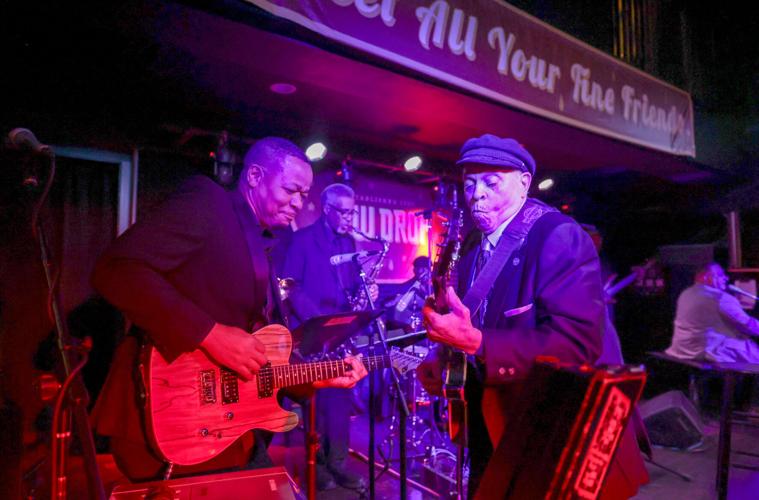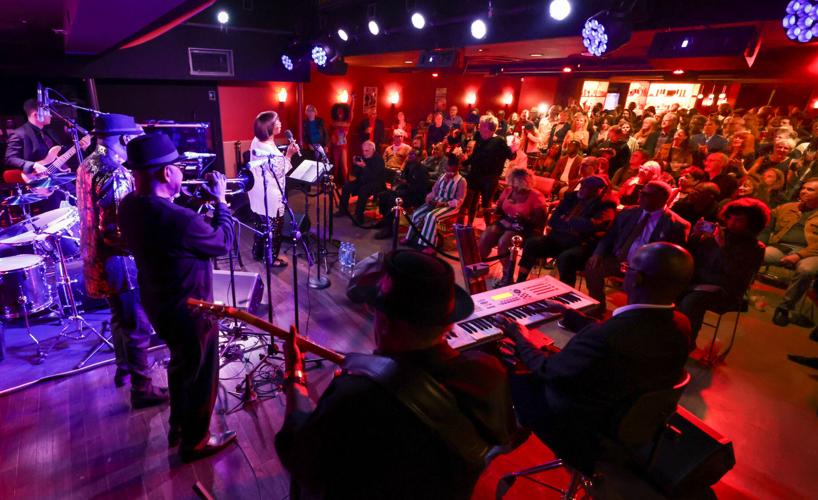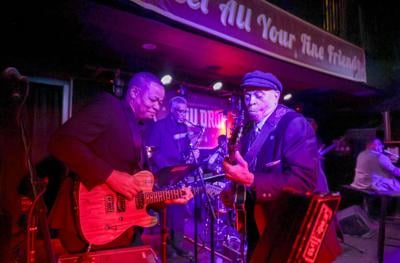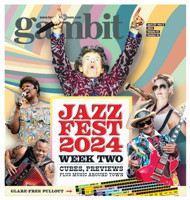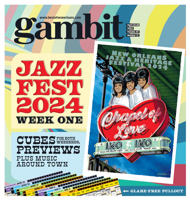When Irma Thomas and Deacon John Moore played the first night of the Dew Drop Inn’s grand reopening party, it had been more than 50 years since live music filled the historic Central City venue.
The New Orleans music legends had played the Dew Drop during its original heyday — Moore and his band the Ivories also had been the venue’s house band in the late ’50s — as did James Brown, Little Richard, Sam Cooke and countless others. So both Moore and Thomas expressed excitement to see the business back open on March 1.
Many of the New Orleans musicians on stage during the two-night celebration also had some connection to the Dew Drop. Raj Smoove, who DJ’d an opening set and a closing dance party the first night, is the son of celebrated pianist Roger Dickerson Sr., who gigged at the Dew Drop back in the day.
The next night, Partners-N-Crime’s set was the first time hip-hop had been performed at the Dew Drop and a subtle nod to the way the venue left a lasting impact on the New Orleans music community. The duo got their start on a popular gong show hosted by Bobby Marchan, who performed and hosted events (often in drag) at the Dew Drop.
The Dew Drop Inn, of course, was and is more than a music venue. Frank Painia opened his business in 1939 as a barbershop and bar and soon expanded it into a hotel, restaurant and nightclub. Today, it’s again a hotel, restaurant, bar and nightclub, with the barbershop transformed into a small museum. But it’s difficult to overstate the role the Dew Drop played in New Orleans and Black American music history.
Now open and hosting live music again, the Dew Drop intends to “honor the past, elevate the present and to nurture the future” in what it presents on stage, says Jocelyne Ninneman, the music and public programming director.
“This place is sacred,” she says. “It’s so important to not just New Orleans history and culture, but in national history and culture and music. And it’s still Black-owned, New Orleanian-owned, independently owned. It’s still in the culture.”

Irma Thomas performs to a packed house as music returns to the historic Dew Drop Inn.
The Dew Drop’s event calendar has been filling up. Recent nights found Ernie Vincent and Bruce “Sunpie” Barnes, Big Chief Bo Dollis Jr. and the Wild Magnolias and Little Freddie King performing on the low stage. There are also weekly throwback DJ sets, including with Raj Smoove and DJ Maxmillion, and brass band shows.
Every Wednesday is the Drop Inn Jam Session hosted by DC Paul. The event is a relaunch of a series hosted by Paul at the New Orleans Jazz Market before the pandemic and a nod to the Dew Drop’s history of jam sessions that would stretch into the early morning.
There are also Tuesday night comedy shows hosted by Marc Caesar, with plans for burlesque and drag shows in the future — another tribute to the Dew Drop’s role in the Black gay community in New Orleans and to people like Marchan and drag queen Patsy Vidalia.
Toward the end of April, the Dew Drop will be in the groove during Jazz Fest. Chief Xian aTunde Adjuah, whose paternal grandfather once played with John Coltrane at the venue, will perform on April 25 and April 26.
April 27 features trumpeter and Anderson .Paak collaborator Maurice “MoBetta” Brown hosting a jam session. And the Sun Ra Arkestra, pioneers of Afrofuturism, will play April 28.
The second weekend of programming will feature more locals, including Partners-N-Crime with the 79rs Gang on Friday and Big Freedia with The Soul Rebels on Saturday. Trumpeter and composer Steve Lands caps the weekend on Sunday, May 5, with “Rearranging the Plants,” a reinterpretation of Gustav Holst’s “The Planets.”
Along with a mix of touring artists and New Orleans-based performers, the Dew Drop hopes to again be a place for musical innovation, Ninneman says.
“We want to set the stage and perhaps a risk and say these nights of the week or the month are for collaboration, experimentation, newness, younger artists,” she says. “I hope we can be that space for evolution and progression in music and culture. What I hear from so many musicians is that they don’t have enough time or space for that in New Orleans.”
In the late ’40s, ’50s and early ’60s, the Dew Drop roared with activity. Local musicians, including Allen Toussaint, Art Neville and Ernie K-Doe, played alongside people like Ray Charles, James Brown and Bobby “Blue” Bland. The venue was one of the legendary spots on the Chitlin’ Circuit, booking Black performers for Black audiences during Jim Crow. There also would be white people at shows, and New Orleans police would raid the club for violating segregation laws.
Four decades in and French Quarter Festival continues to grow.
After the Civil Rights Act of 1964 made segregation illegal, many Black musicians and audiences steadily found more opportunities, and business at the Dew Drop slowly declined. It hosted its last live show in 1970.
Owner Painia died in 1972 and his family continued to operate the hotel until Hurricane Katrina and the federal levee failures destroyed the business. Efforts had been made over the years to reopen, but nothing worked out until 2021, when developer Curtis Doucette purchased the property. Kenneth Jackson, Pania’s grandson, is a part owner today.
Doucette, who founded the real estate company Iris Development, is a New Orleans native, and his family owned the Nite Cap, a club that became the spot for a new generation of New Orleans bands in the ’70s, like The Meters, the Batiste Brothers and Chocolate Milk.
After an extensive renovation, the Dew Drop reopened in March as a 17-room hotel, bar, restaurant and nightclub. There’s also a patio space and a pool. Each of the rooms is dedicated to a notable figure in the Dew Drop’s history, like Thomas and Marchan.
Doucette told Gambit last fall that he wanted to host national and international acts on the historic stage, as well as local musicians bringing something new to the table.
“We’d like to become a place where we discover the next Little Richard — of course, that’s probably going to be an entirely different genre of music, right?” he says. “And of course, we couldn’t sustain the business without our local musicians who are tearing it up in New Orleans.”
Find more information and the schedule of events at dewdropinnnola.com.
Owner Frank Painia opened his bar, restaurant, barbershop and hotel in 1939.
Keep up with the latest at calendar.gambitweekly.com.


